Factors Affecting Planning and Organisation of Study, Learning Theories Evaluation
VerifiedAdded on 2023/06/13
|14
|2387
|481
AI Summary
The article discusses the factors affecting planning and organisation of study, evaluation of learning strengths and weaknesses in relation to a learning theory, and evaluation of two recognised learning theories - Behaviourism Learning Theory and Cognitive Learning Theory. It also provides practical and realistic strategies for addressing learning weaknesses.
Contribute Materials
Your contribution can guide someone’s learning journey. Share your
documents today.
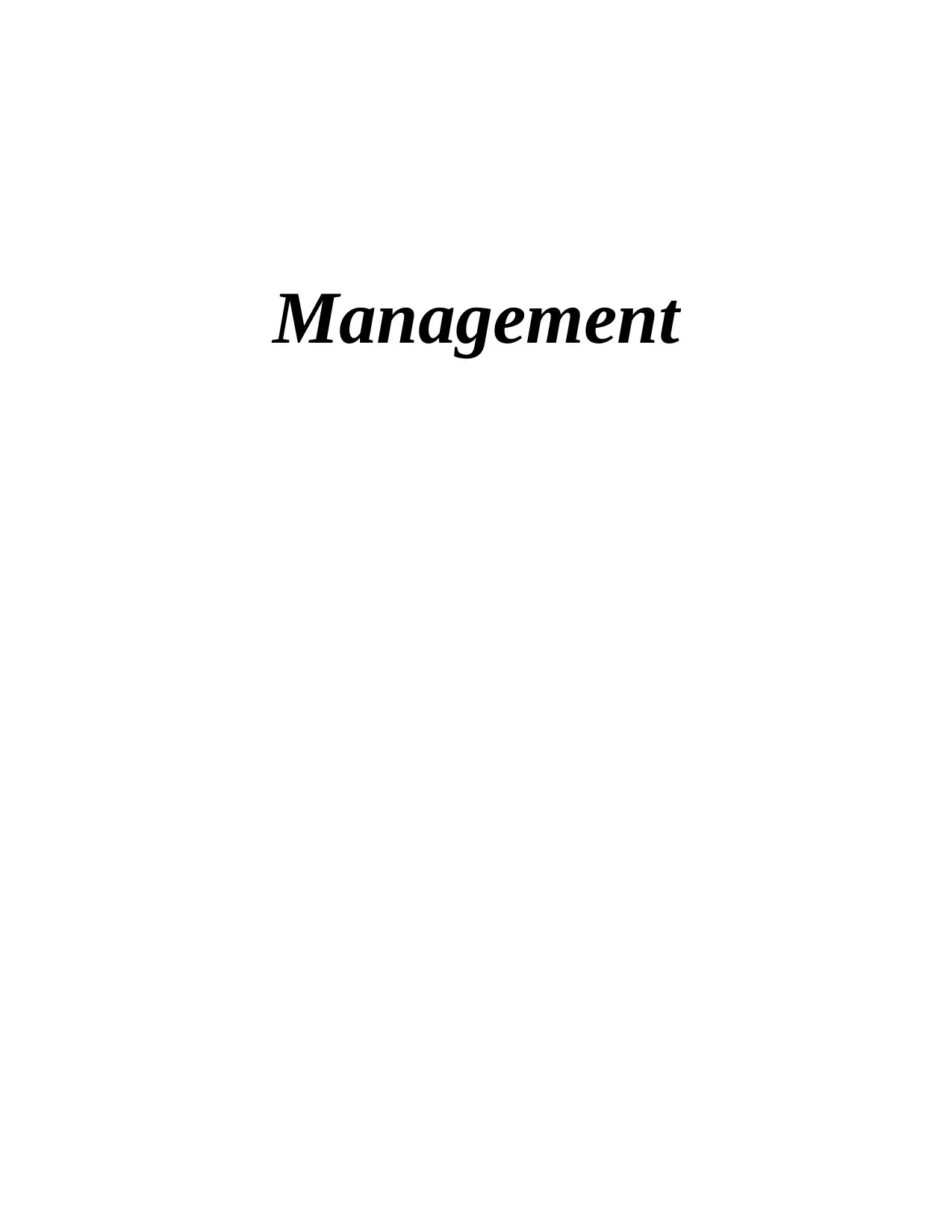
Management
Secure Best Marks with AI Grader
Need help grading? Try our AI Grader for instant feedback on your assignments.
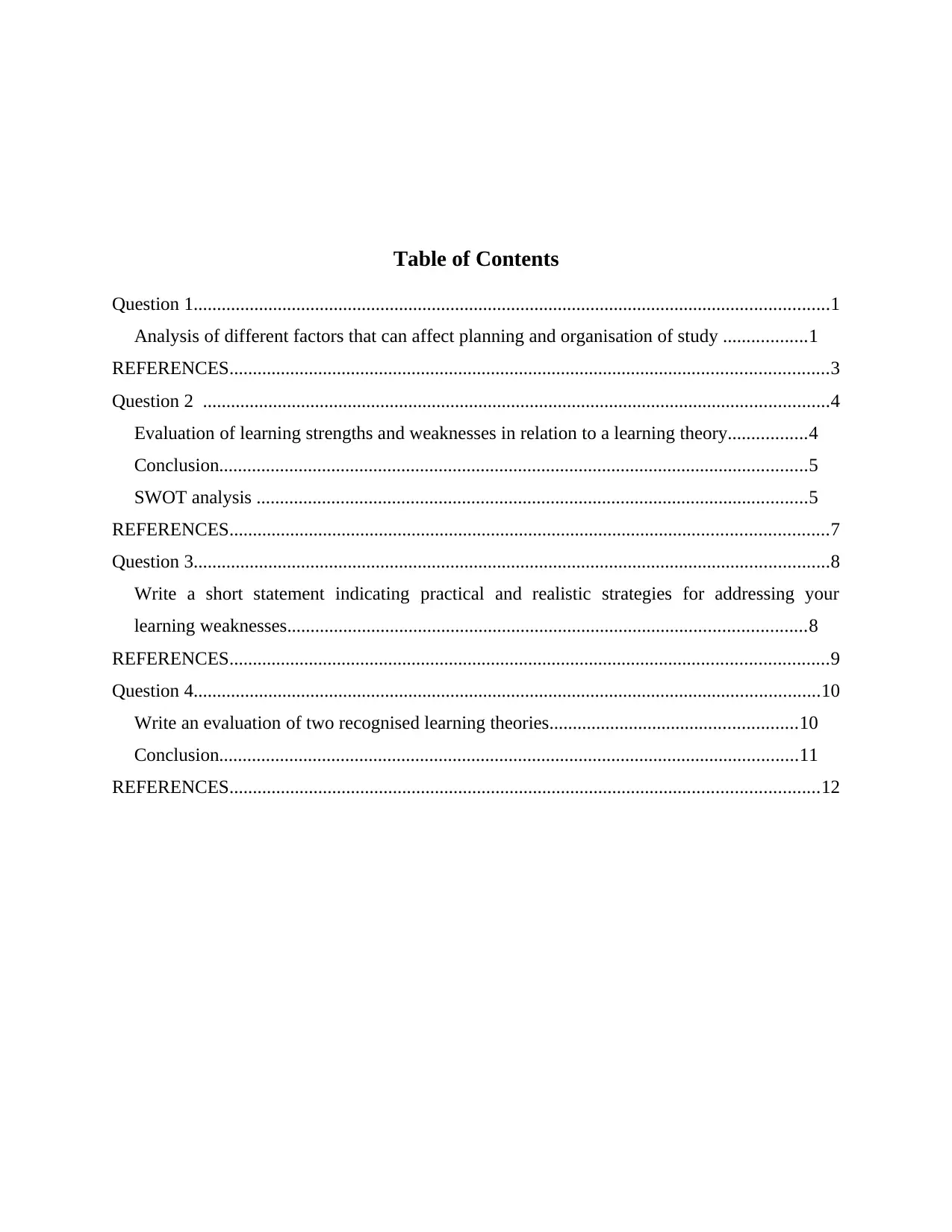
Table of Contents
Question 1........................................................................................................................................1
Analysis of different factors that can affect planning and organisation of study ..................1
REFERENCES................................................................................................................................3
Question 2 ......................................................................................................................................4
Evaluation of learning strengths and weaknesses in relation to a learning theory.................4
Conclusion..............................................................................................................................5
SWOT analysis ......................................................................................................................5
REFERENCES................................................................................................................................7
Question 3........................................................................................................................................8
Write a short statement indicating practical and realistic strategies for addressing your
learning weaknesses...............................................................................................................8
REFERENCES................................................................................................................................9
Question 4......................................................................................................................................10
Write an evaluation of two recognised learning theories.....................................................10
Conclusion............................................................................................................................11
REFERENCES..............................................................................................................................12
Question 1........................................................................................................................................1
Analysis of different factors that can affect planning and organisation of study ..................1
REFERENCES................................................................................................................................3
Question 2 ......................................................................................................................................4
Evaluation of learning strengths and weaknesses in relation to a learning theory.................4
Conclusion..............................................................................................................................5
SWOT analysis ......................................................................................................................5
REFERENCES................................................................................................................................7
Question 3........................................................................................................................................8
Write a short statement indicating practical and realistic strategies for addressing your
learning weaknesses...............................................................................................................8
REFERENCES................................................................................................................................9
Question 4......................................................................................................................................10
Write an evaluation of two recognised learning theories.....................................................10
Conclusion............................................................................................................................11
REFERENCES..............................................................................................................................12
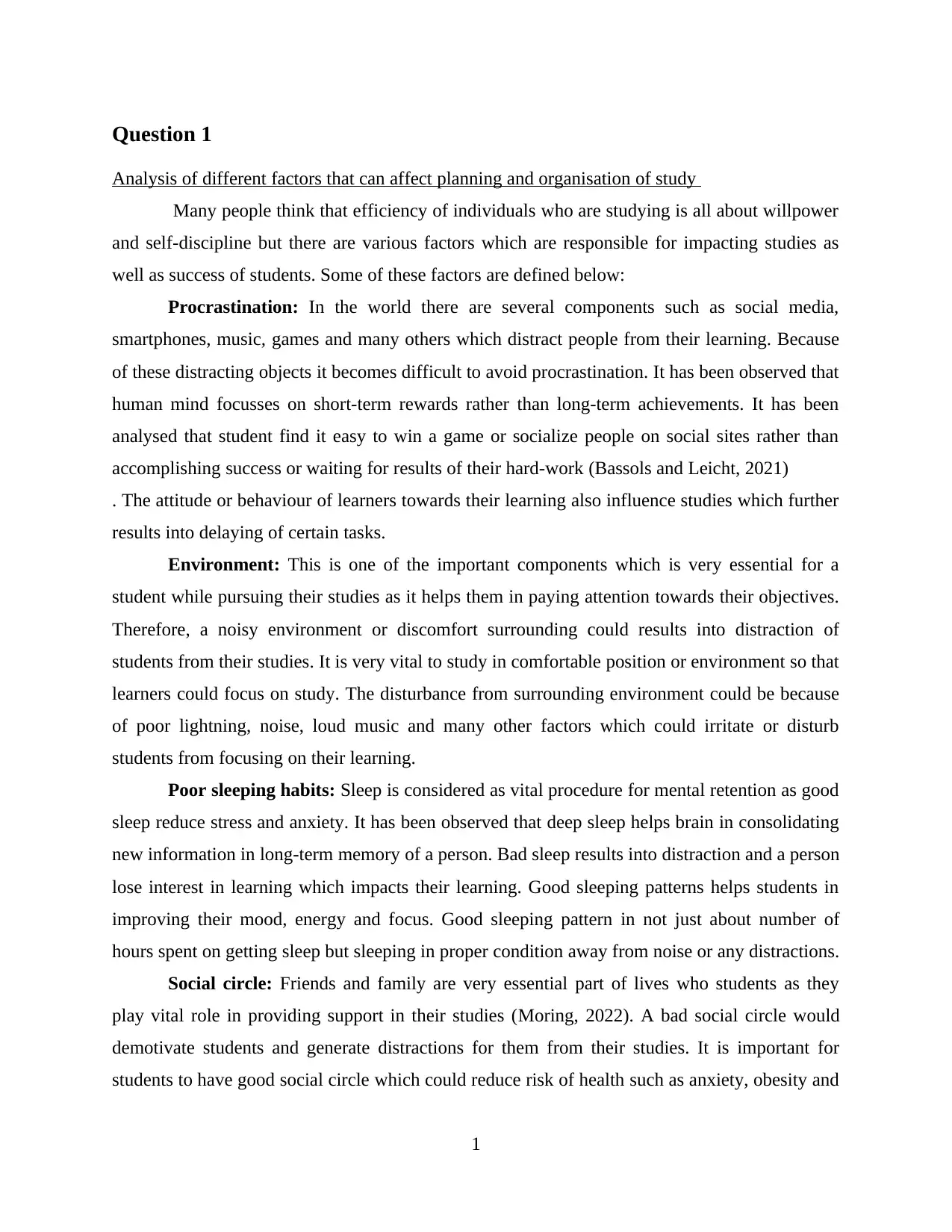
Question 1
Analysis of different factors that can affect planning and organisation of study
Many people think that efficiency of individuals who are studying is all about willpower
and self-discipline but there are various factors which are responsible for impacting studies as
well as success of students. Some of these factors are defined below:
Procrastination: In the world there are several components such as social media,
smartphones, music, games and many others which distract people from their learning. Because
of these distracting objects it becomes difficult to avoid procrastination. It has been observed that
human mind focusses on short-term rewards rather than long-term achievements. It has been
analysed that student find it easy to win a game or socialize people on social sites rather than
accomplishing success or waiting for results of their hard-work (Bassols and Leicht, 2021)
. The attitude or behaviour of learners towards their learning also influence studies which further
results into delaying of certain tasks.
Environment: This is one of the important components which is very essential for a
student while pursuing their studies as it helps them in paying attention towards their objectives.
Therefore, a noisy environment or discomfort surrounding could results into distraction of
students from their studies. It is very vital to study in comfortable position or environment so that
learners could focus on study. The disturbance from surrounding environment could be because
of poor lightning, noise, loud music and many other factors which could irritate or disturb
students from focusing on their learning.
Poor sleeping habits: Sleep is considered as vital procedure for mental retention as good
sleep reduce stress and anxiety. It has been observed that deep sleep helps brain in consolidating
new information in long-term memory of a person. Bad sleep results into distraction and a person
lose interest in learning which impacts their learning. Good sleeping patterns helps students in
improving their mood, energy and focus. Good sleeping pattern in not just about number of
hours spent on getting sleep but sleeping in proper condition away from noise or any distractions.
Social circle: Friends and family are very essential part of lives who students as they
play vital role in providing support in their studies (Moring, 2022). A bad social circle would
demotivate students and generate distractions for them from their studies. It is important for
students to have good social circle which could reduce risk of health such as anxiety, obesity and
1
Analysis of different factors that can affect planning and organisation of study
Many people think that efficiency of individuals who are studying is all about willpower
and self-discipline but there are various factors which are responsible for impacting studies as
well as success of students. Some of these factors are defined below:
Procrastination: In the world there are several components such as social media,
smartphones, music, games and many others which distract people from their learning. Because
of these distracting objects it becomes difficult to avoid procrastination. It has been observed that
human mind focusses on short-term rewards rather than long-term achievements. It has been
analysed that student find it easy to win a game or socialize people on social sites rather than
accomplishing success or waiting for results of their hard-work (Bassols and Leicht, 2021)
. The attitude or behaviour of learners towards their learning also influence studies which further
results into delaying of certain tasks.
Environment: This is one of the important components which is very essential for a
student while pursuing their studies as it helps them in paying attention towards their objectives.
Therefore, a noisy environment or discomfort surrounding could results into distraction of
students from their studies. It is very vital to study in comfortable position or environment so that
learners could focus on study. The disturbance from surrounding environment could be because
of poor lightning, noise, loud music and many other factors which could irritate or disturb
students from focusing on their learning.
Poor sleeping habits: Sleep is considered as vital procedure for mental retention as good
sleep reduce stress and anxiety. It has been observed that deep sleep helps brain in consolidating
new information in long-term memory of a person. Bad sleep results into distraction and a person
lose interest in learning which impacts their learning. Good sleeping patterns helps students in
improving their mood, energy and focus. Good sleeping pattern in not just about number of
hours spent on getting sleep but sleeping in proper condition away from noise or any distractions.
Social circle: Friends and family are very essential part of lives who students as they
play vital role in providing support in their studies (Moring, 2022). A bad social circle would
demotivate students and generate distractions for them from their studies. It is important for
students to have good social circle which could reduce risk of health such as anxiety, obesity and
1
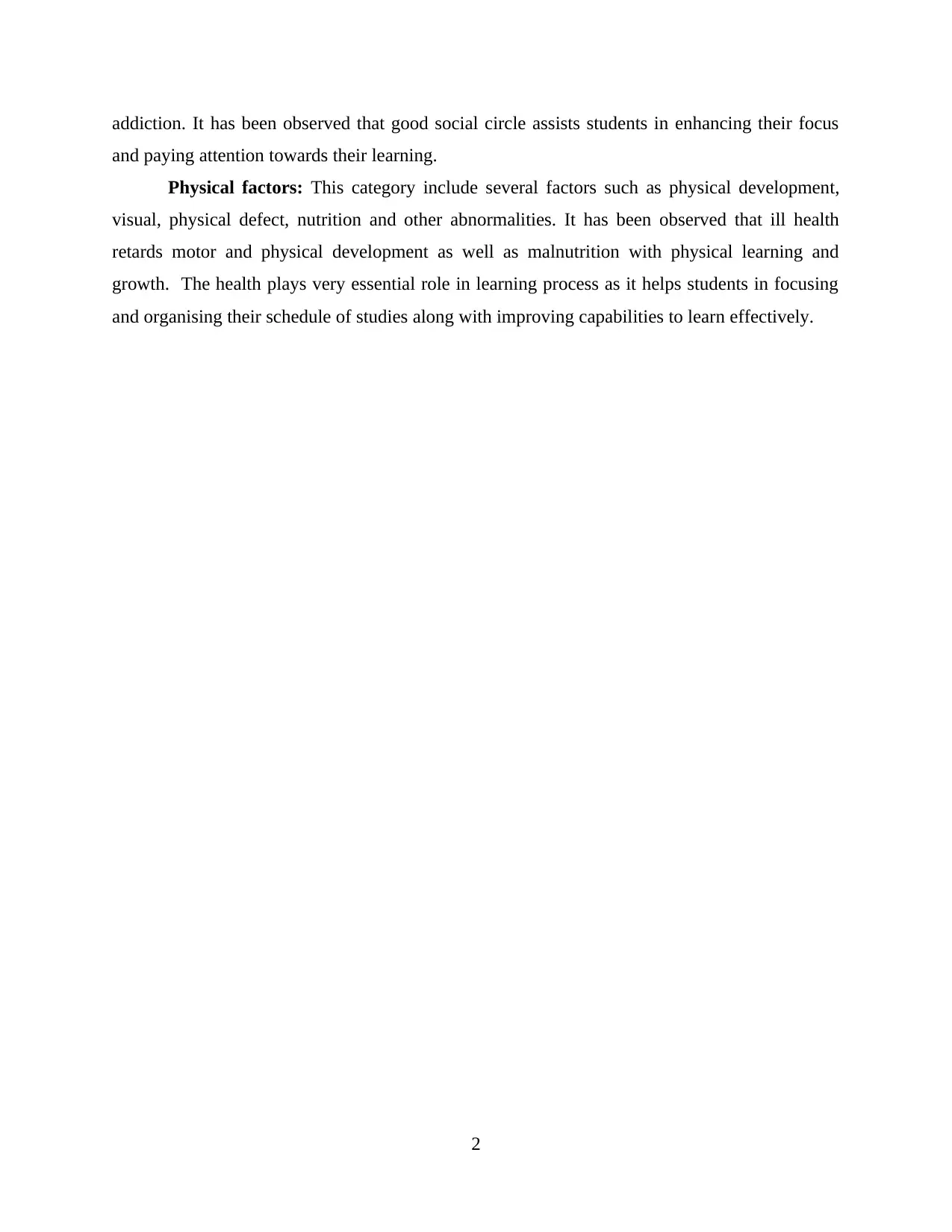
addiction. It has been observed that good social circle assists students in enhancing their focus
and paying attention towards their learning.
Physical factors: This category include several factors such as physical development,
visual, physical defect, nutrition and other abnormalities. It has been observed that ill health
retards motor and physical development as well as malnutrition with physical learning and
growth. The health plays very essential role in learning process as it helps students in focusing
and organising their schedule of studies along with improving capabilities to learn effectively.
2
and paying attention towards their learning.
Physical factors: This category include several factors such as physical development,
visual, physical defect, nutrition and other abnormalities. It has been observed that ill health
retards motor and physical development as well as malnutrition with physical learning and
growth. The health plays very essential role in learning process as it helps students in focusing
and organising their schedule of studies along with improving capabilities to learn effectively.
2
Secure Best Marks with AI Grader
Need help grading? Try our AI Grader for instant feedback on your assignments.
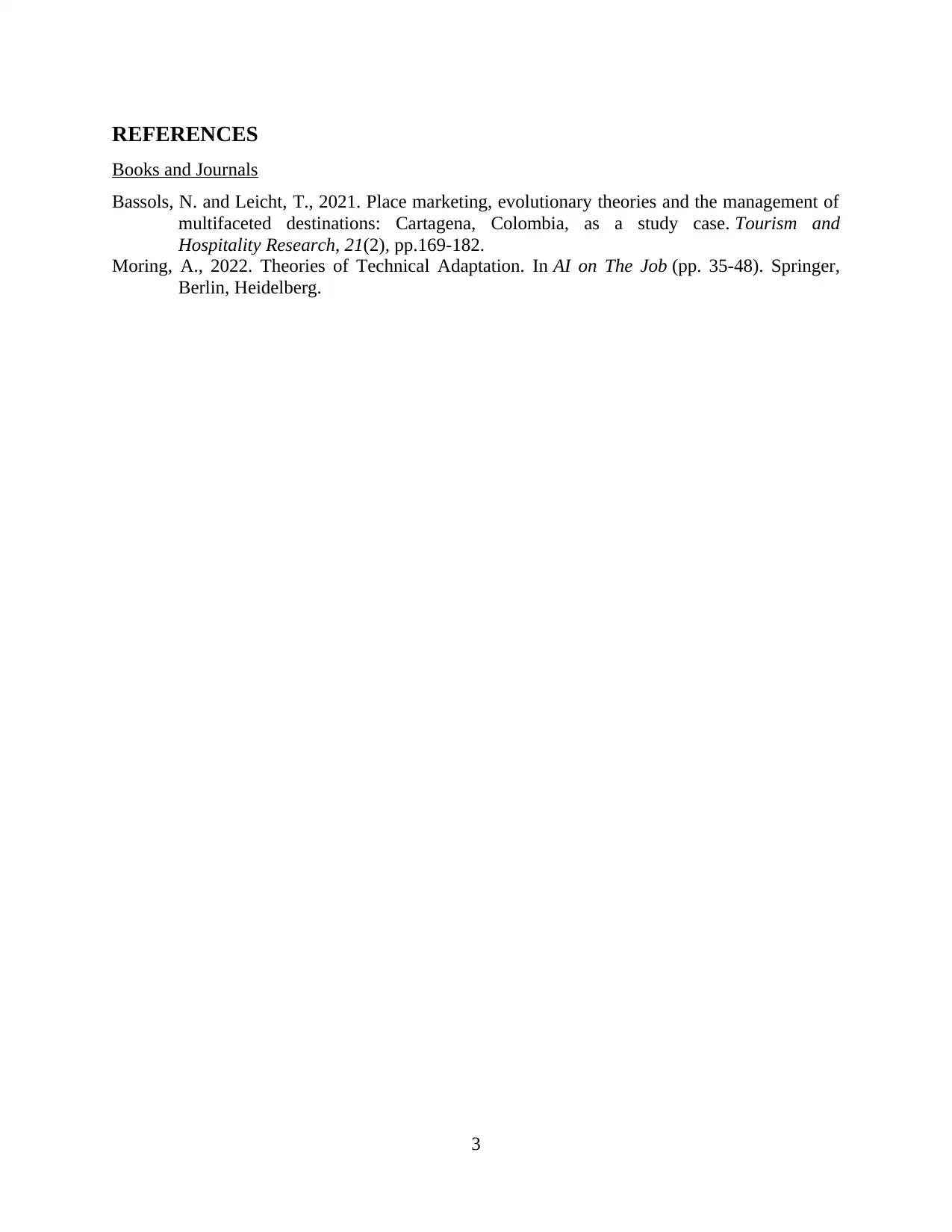
REFERENCES
Books and Journals
Bassols, N. and Leicht, T., 2021. Place marketing, evolutionary theories and the management of
multifaceted destinations: Cartagena, Colombia, as a study case. Tourism and
Hospitality Research, 21(2), pp.169-182.
Moring, A., 2022. Theories of Technical Adaptation. In AI on The Job (pp. 35-48). Springer,
Berlin, Heidelberg.
3
Books and Journals
Bassols, N. and Leicht, T., 2021. Place marketing, evolutionary theories and the management of
multifaceted destinations: Cartagena, Colombia, as a study case. Tourism and
Hospitality Research, 21(2), pp.169-182.
Moring, A., 2022. Theories of Technical Adaptation. In AI on The Job (pp. 35-48). Springer,
Berlin, Heidelberg.
3
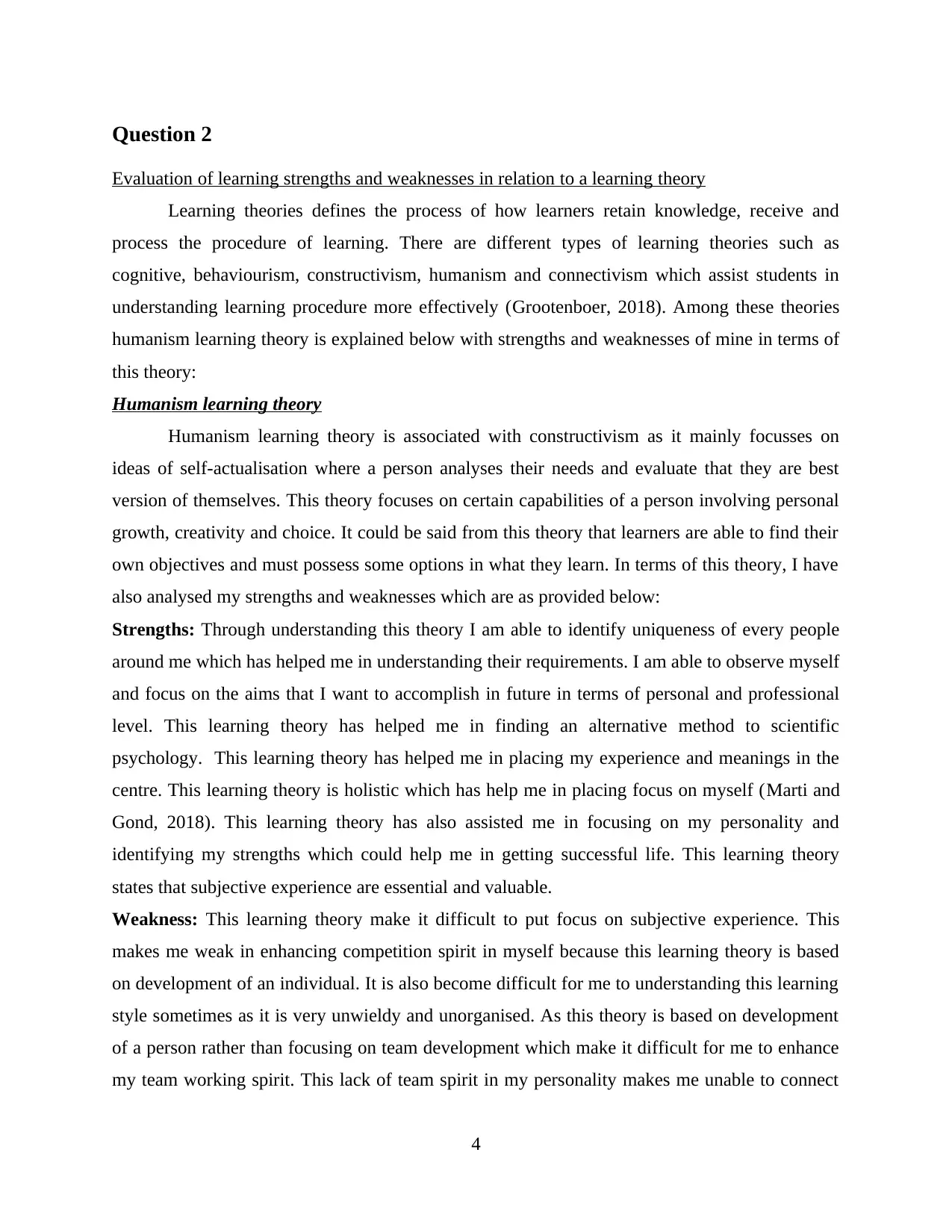
Question 2
Evaluation of learning strengths and weaknesses in relation to a learning theory
Learning theories defines the process of how learners retain knowledge, receive and
process the procedure of learning. There are different types of learning theories such as
cognitive, behaviourism, constructivism, humanism and connectivism which assist students in
understanding learning procedure more effectively (Grootenboer, 2018). Among these theories
humanism learning theory is explained below with strengths and weaknesses of mine in terms of
this theory:
Humanism learning theory
Humanism learning theory is associated with constructivism as it mainly focusses on
ideas of self-actualisation where a person analyses their needs and evaluate that they are best
version of themselves. This theory focuses on certain capabilities of a person involving personal
growth, creativity and choice. It could be said from this theory that learners are able to find their
own objectives and must possess some options in what they learn. In terms of this theory, I have
also analysed my strengths and weaknesses which are as provided below:
Strengths: Through understanding this theory I am able to identify uniqueness of every people
around me which has helped me in understanding their requirements. I am able to observe myself
and focus on the aims that I want to accomplish in future in terms of personal and professional
level. This learning theory has helped me in finding an alternative method to scientific
psychology. This learning theory has helped me in placing my experience and meanings in the
centre. This learning theory is holistic which has help me in placing focus on myself (Marti and
Gond, 2018). This learning theory has also assisted me in focusing on my personality and
identifying my strengths which could help me in getting successful life. This learning theory
states that subjective experience are essential and valuable.
Weakness: This learning theory make it difficult to put focus on subjective experience. This
makes me weak in enhancing competition spirit in myself because this learning theory is based
on development of an individual. It is also become difficult for me to understanding this learning
style sometimes as it is very unwieldy and unorganised. As this theory is based on development
of a person rather than focusing on team development which make it difficult for me to enhance
my team working spirit. This lack of team spirit in my personality makes me unable to connect
4
Evaluation of learning strengths and weaknesses in relation to a learning theory
Learning theories defines the process of how learners retain knowledge, receive and
process the procedure of learning. There are different types of learning theories such as
cognitive, behaviourism, constructivism, humanism and connectivism which assist students in
understanding learning procedure more effectively (Grootenboer, 2018). Among these theories
humanism learning theory is explained below with strengths and weaknesses of mine in terms of
this theory:
Humanism learning theory
Humanism learning theory is associated with constructivism as it mainly focusses on
ideas of self-actualisation where a person analyses their needs and evaluate that they are best
version of themselves. This theory focuses on certain capabilities of a person involving personal
growth, creativity and choice. It could be said from this theory that learners are able to find their
own objectives and must possess some options in what they learn. In terms of this theory, I have
also analysed my strengths and weaknesses which are as provided below:
Strengths: Through understanding this theory I am able to identify uniqueness of every people
around me which has helped me in understanding their requirements. I am able to observe myself
and focus on the aims that I want to accomplish in future in terms of personal and professional
level. This learning theory has helped me in finding an alternative method to scientific
psychology. This learning theory has helped me in placing my experience and meanings in the
centre. This learning theory is holistic which has help me in placing focus on myself (Marti and
Gond, 2018). This learning theory has also assisted me in focusing on my personality and
identifying my strengths which could help me in getting successful life. This learning theory
states that subjective experience are essential and valuable.
Weakness: This learning theory make it difficult to put focus on subjective experience. This
makes me weak in enhancing competition spirit in myself because this learning theory is based
on development of an individual. It is also become difficult for me to understanding this learning
style sometimes as it is very unwieldy and unorganised. As this theory is based on development
of a person rather than focusing on team development which make it difficult for me to enhance
my team working spirit. This lack of team spirit in my personality makes me unable to connect
4
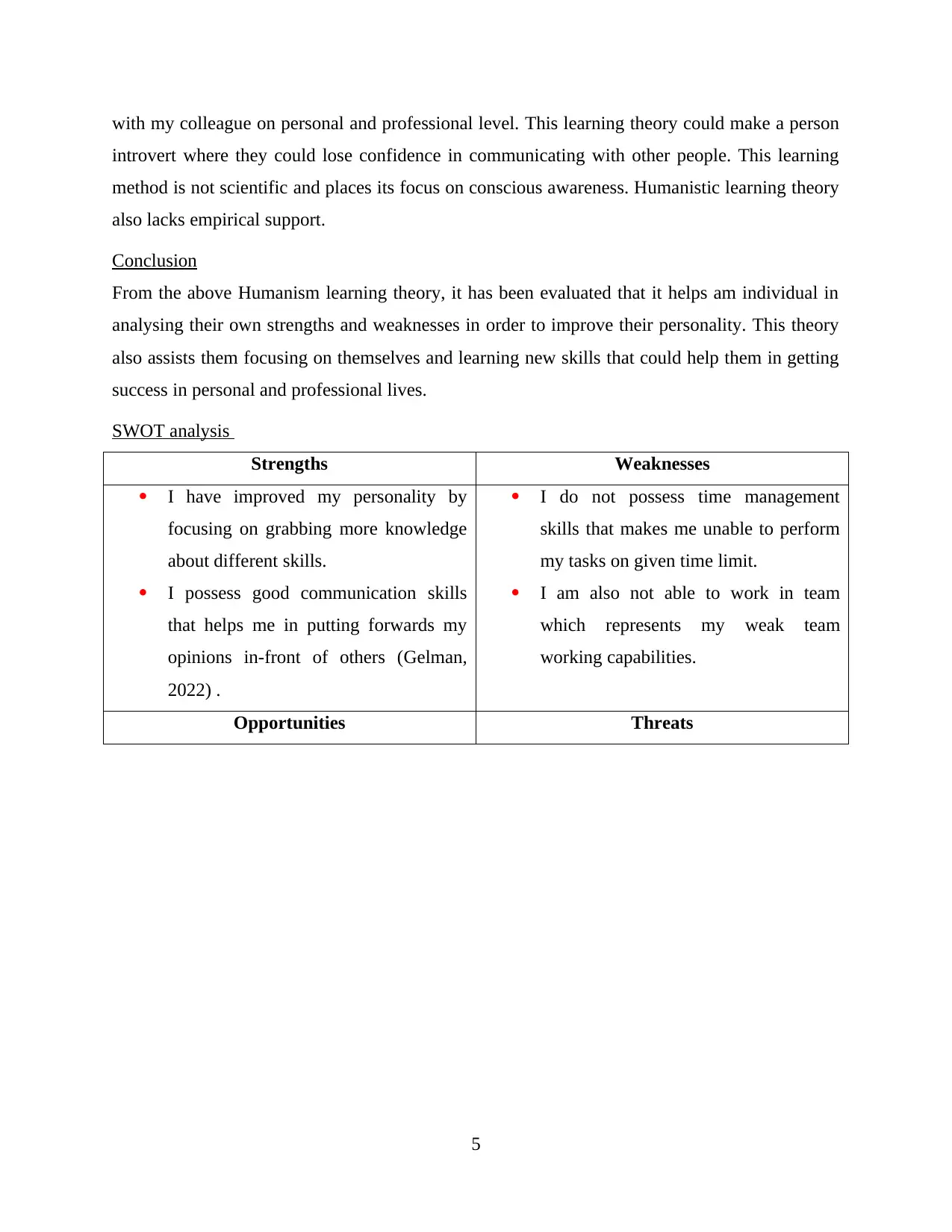
with my colleague on personal and professional level. This learning theory could make a person
introvert where they could lose confidence in communicating with other people. This learning
method is not scientific and places its focus on conscious awareness. Humanistic learning theory
also lacks empirical support.
Conclusion
From the above Humanism learning theory, it has been evaluated that it helps am individual in
analysing their own strengths and weaknesses in order to improve their personality. This theory
also assists them focusing on themselves and learning new skills that could help them in getting
success in personal and professional lives.
SWOT analysis
Strengths Weaknesses
I have improved my personality by
focusing on grabbing more knowledge
about different skills.
I possess good communication skills
that helps me in putting forwards my
opinions in-front of others (Gelman,
2022) .
I do not possess time management
skills that makes me unable to perform
my tasks on given time limit.
I am also not able to work in team
which represents my weak team
working capabilities.
Opportunities Threats
5
introvert where they could lose confidence in communicating with other people. This learning
method is not scientific and places its focus on conscious awareness. Humanistic learning theory
also lacks empirical support.
Conclusion
From the above Humanism learning theory, it has been evaluated that it helps am individual in
analysing their own strengths and weaknesses in order to improve their personality. This theory
also assists them focusing on themselves and learning new skills that could help them in getting
success in personal and professional lives.
SWOT analysis
Strengths Weaknesses
I have improved my personality by
focusing on grabbing more knowledge
about different skills.
I possess good communication skills
that helps me in putting forwards my
opinions in-front of others (Gelman,
2022) .
I do not possess time management
skills that makes me unable to perform
my tasks on given time limit.
I am also not able to work in team
which represents my weak team
working capabilities.
Opportunities Threats
5
Paraphrase This Document
Need a fresh take? Get an instant paraphrase of this document with our AI Paraphraser
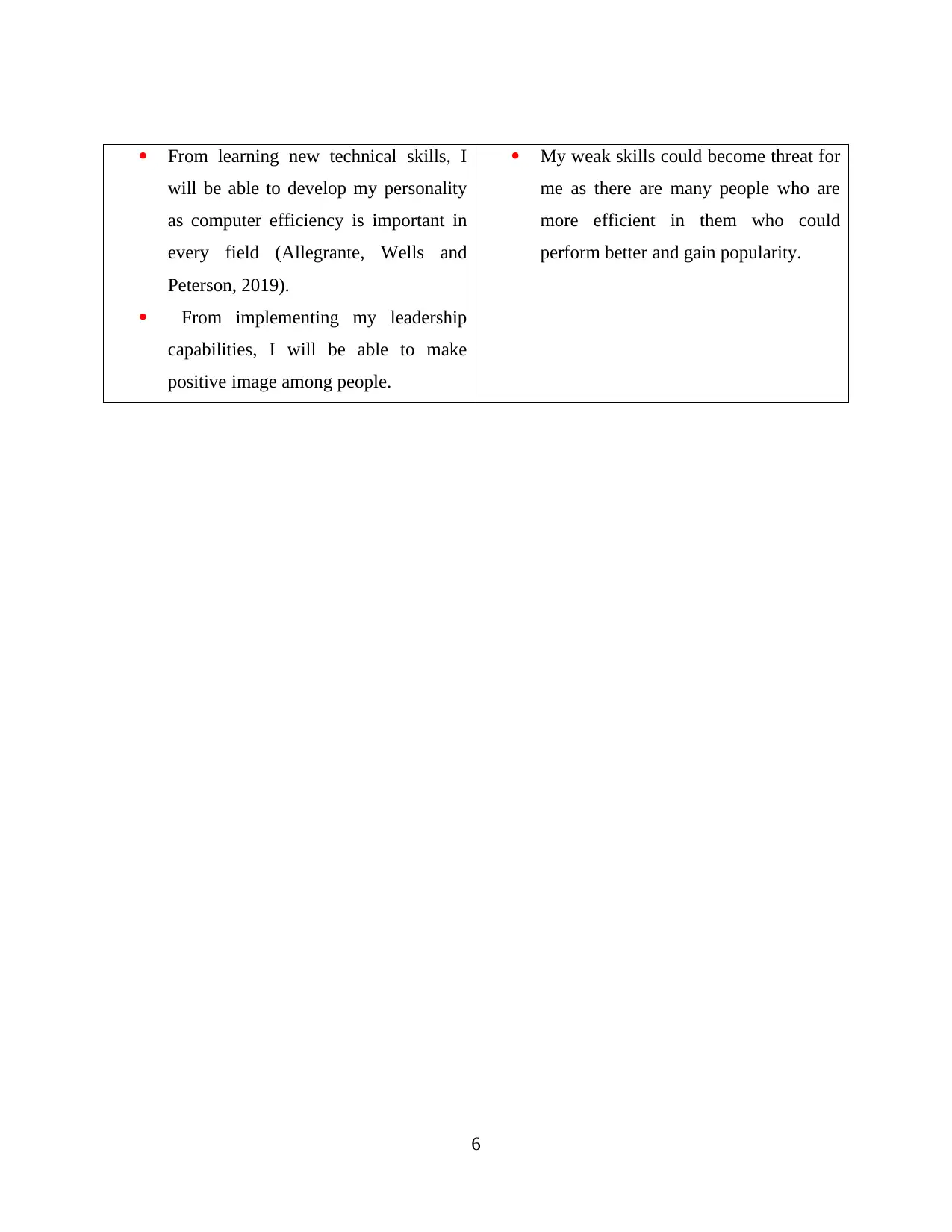
From learning new technical skills, I
will be able to develop my personality
as computer efficiency is important in
every field (Allegrante, Wells and
Peterson, 2019).
From implementing my leadership
capabilities, I will be able to make
positive image among people.
My weak skills could become threat for
me as there are many people who are
more efficient in them who could
perform better and gain popularity.
6
will be able to develop my personality
as computer efficiency is important in
every field (Allegrante, Wells and
Peterson, 2019).
From implementing my leadership
capabilities, I will be able to make
positive image among people.
My weak skills could become threat for
me as there are many people who are
more efficient in them who could
perform better and gain popularity.
6
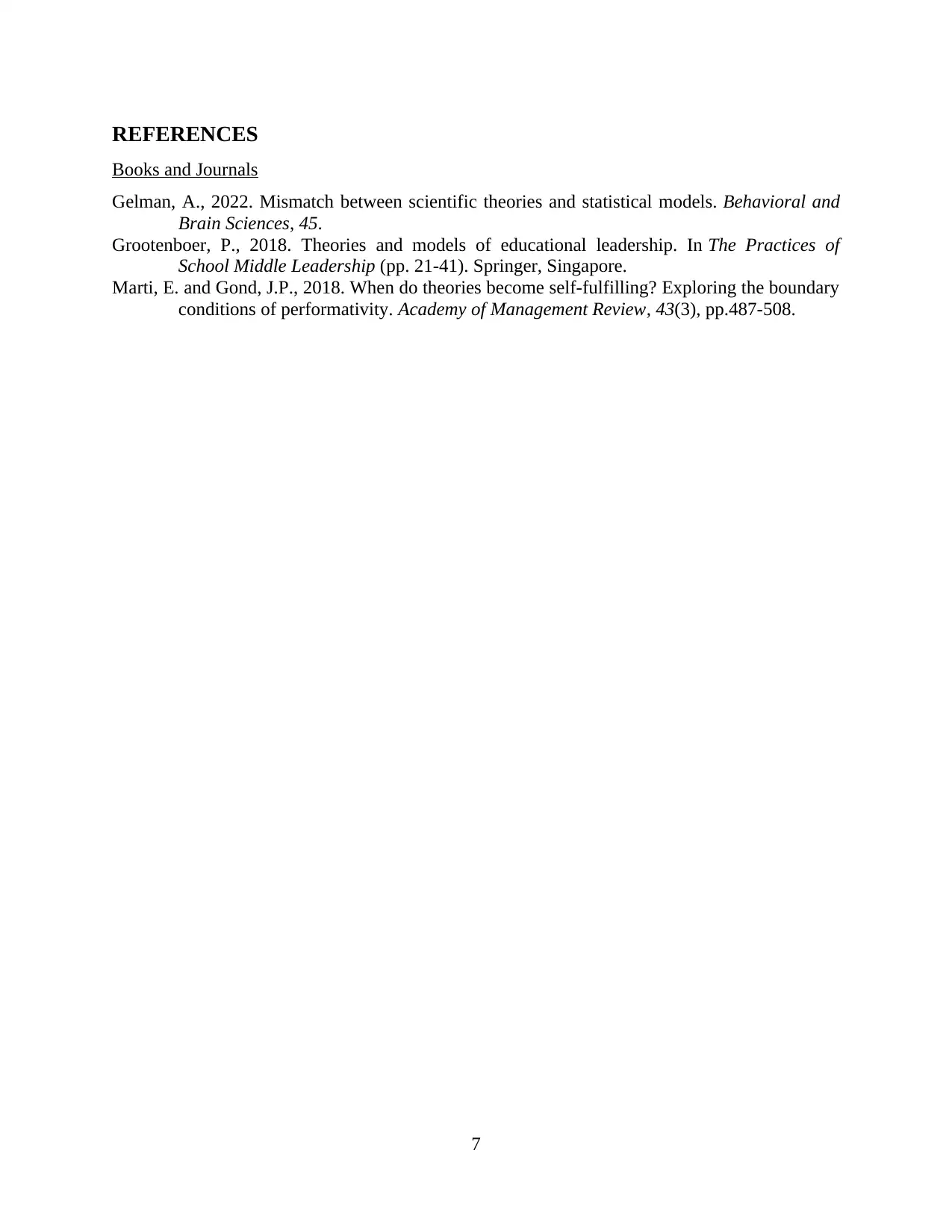
REFERENCES
Books and Journals
Gelman, A., 2022. Mismatch between scientific theories and statistical models. Behavioral and
Brain Sciences, 45.
Grootenboer, P., 2018. Theories and models of educational leadership. In The Practices of
School Middle Leadership (pp. 21-41). Springer, Singapore.
Marti, E. and Gond, J.P., 2018. When do theories become self-fulfilling? Exploring the boundary
conditions of performativity. Academy of Management Review, 43(3), pp.487-508.
7
Books and Journals
Gelman, A., 2022. Mismatch between scientific theories and statistical models. Behavioral and
Brain Sciences, 45.
Grootenboer, P., 2018. Theories and models of educational leadership. In The Practices of
School Middle Leadership (pp. 21-41). Springer, Singapore.
Marti, E. and Gond, J.P., 2018. When do theories become self-fulfilling? Exploring the boundary
conditions of performativity. Academy of Management Review, 43(3), pp.487-508.
7
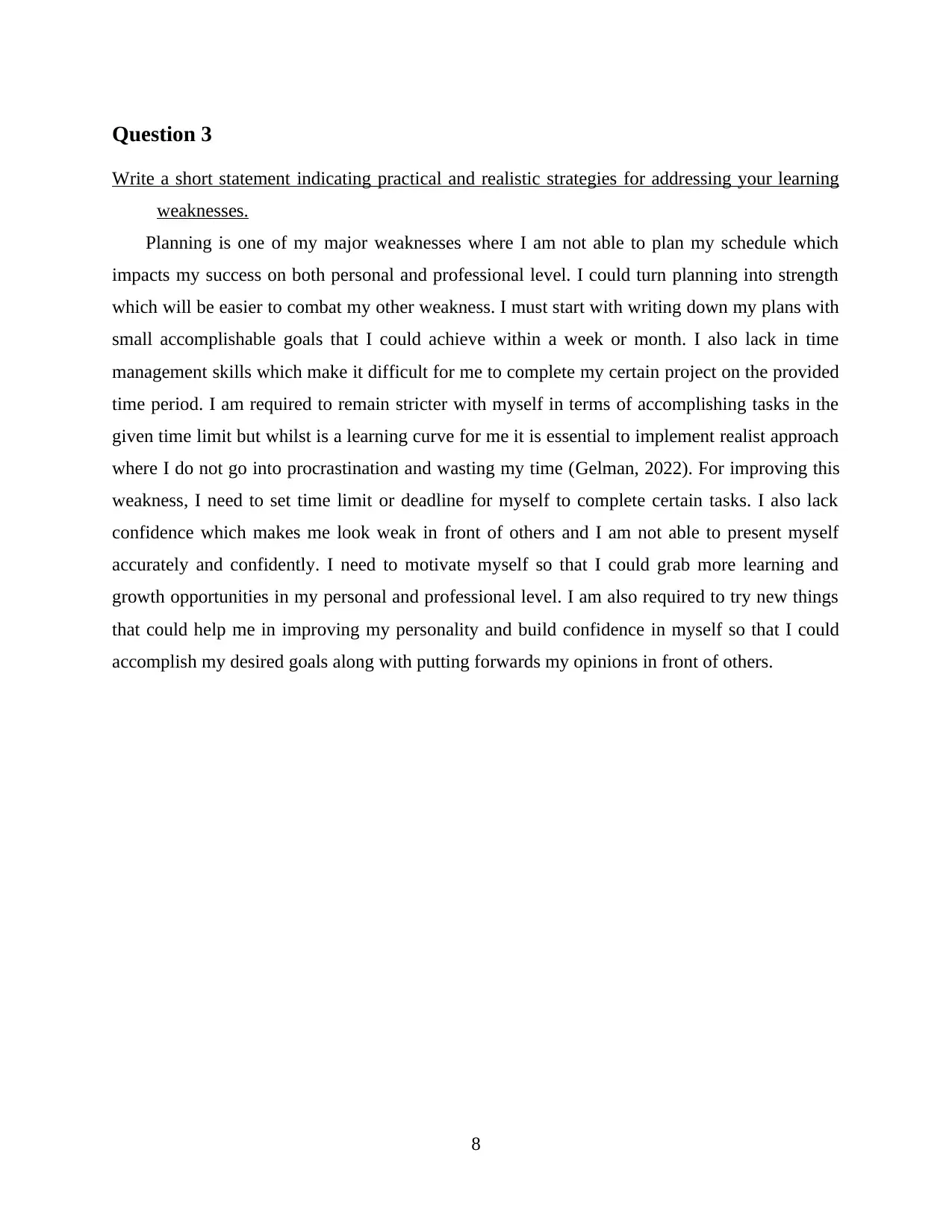
Question 3
Write a short statement indicating practical and realistic strategies for addressing your learning
weaknesses.
Planning is one of my major weaknesses where I am not able to plan my schedule which
impacts my success on both personal and professional level. I could turn planning into strength
which will be easier to combat my other weakness. I must start with writing down my plans with
small accomplishable goals that I could achieve within a week or month. I also lack in time
management skills which make it difficult for me to complete my certain project on the provided
time period. I am required to remain stricter with myself in terms of accomplishing tasks in the
given time limit but whilst is a learning curve for me it is essential to implement realist approach
where I do not go into procrastination and wasting my time (Gelman, 2022). For improving this
weakness, I need to set time limit or deadline for myself to complete certain tasks. I also lack
confidence which makes me look weak in front of others and I am not able to present myself
accurately and confidently. I need to motivate myself so that I could grab more learning and
growth opportunities in my personal and professional level. I am also required to try new things
that could help me in improving my personality and build confidence in myself so that I could
accomplish my desired goals along with putting forwards my opinions in front of others.
8
Write a short statement indicating practical and realistic strategies for addressing your learning
weaknesses.
Planning is one of my major weaknesses where I am not able to plan my schedule which
impacts my success on both personal and professional level. I could turn planning into strength
which will be easier to combat my other weakness. I must start with writing down my plans with
small accomplishable goals that I could achieve within a week or month. I also lack in time
management skills which make it difficult for me to complete my certain project on the provided
time period. I am required to remain stricter with myself in terms of accomplishing tasks in the
given time limit but whilst is a learning curve for me it is essential to implement realist approach
where I do not go into procrastination and wasting my time (Gelman, 2022). For improving this
weakness, I need to set time limit or deadline for myself to complete certain tasks. I also lack
confidence which makes me look weak in front of others and I am not able to present myself
accurately and confidently. I need to motivate myself so that I could grab more learning and
growth opportunities in my personal and professional level. I am also required to try new things
that could help me in improving my personality and build confidence in myself so that I could
accomplish my desired goals along with putting forwards my opinions in front of others.
8
Secure Best Marks with AI Grader
Need help grading? Try our AI Grader for instant feedback on your assignments.
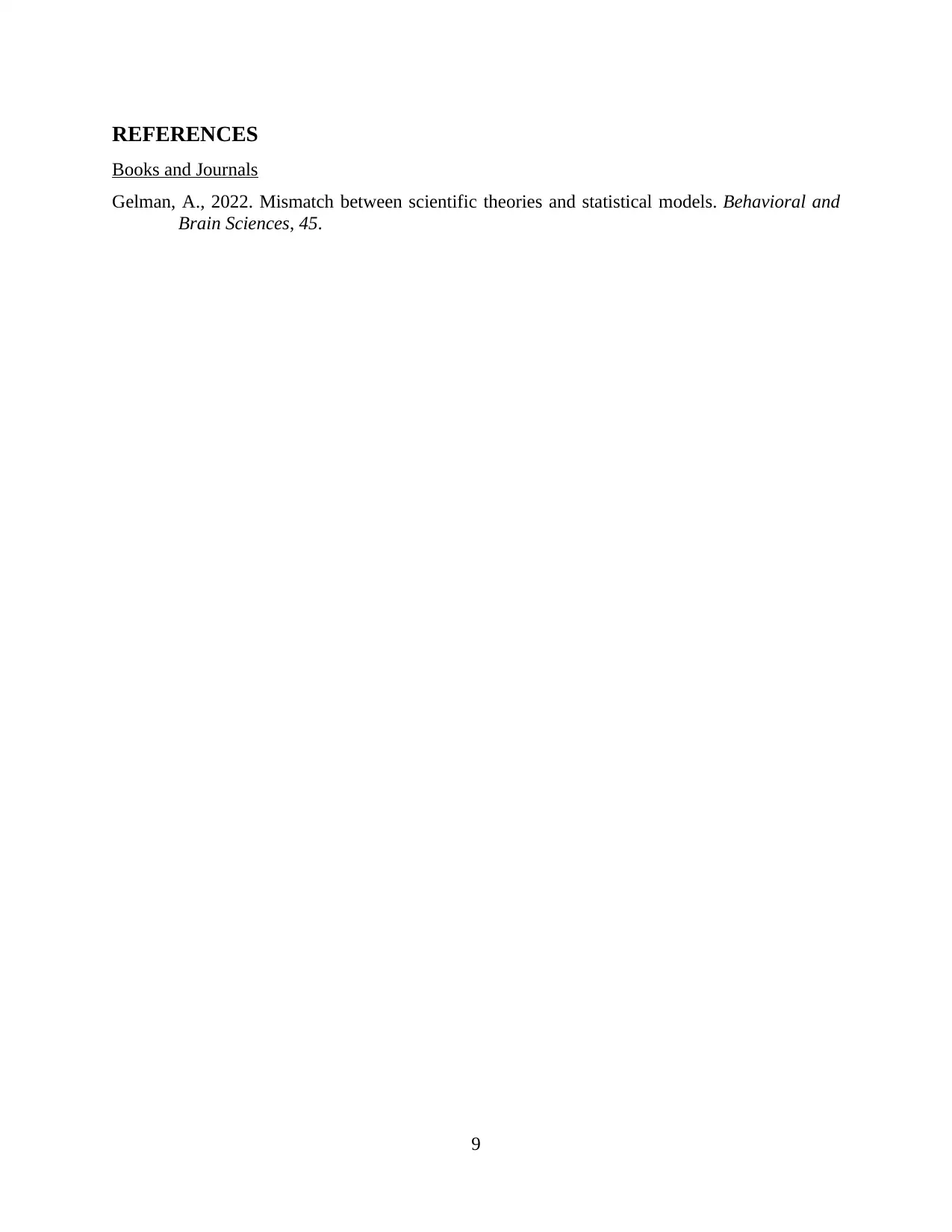
REFERENCES
Books and Journals
Gelman, A., 2022. Mismatch between scientific theories and statistical models. Behavioral and
Brain Sciences, 45.
9
Books and Journals
Gelman, A., 2022. Mismatch between scientific theories and statistical models. Behavioral and
Brain Sciences, 45.
9
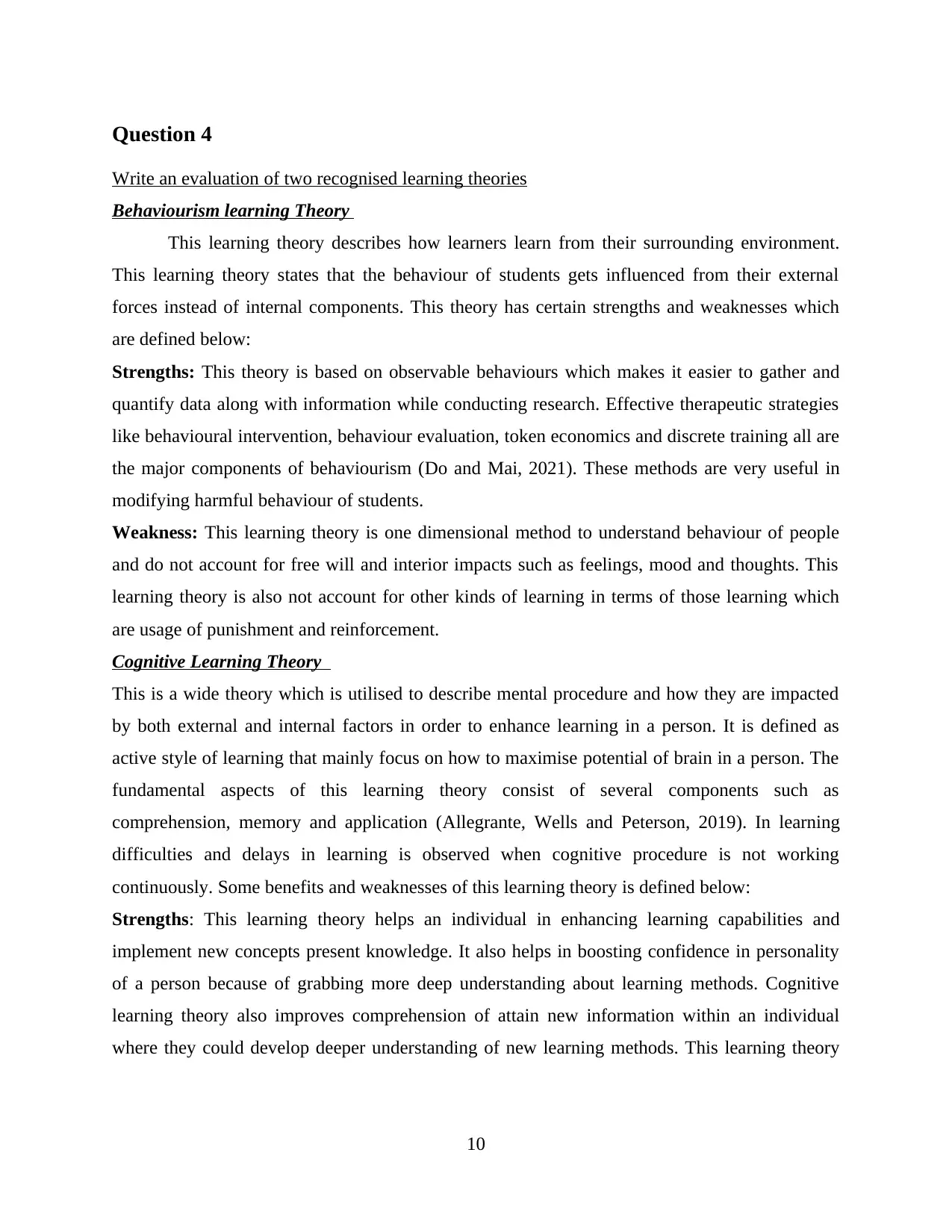
Question 4
Write an evaluation of two recognised learning theories
Behaviourism learning Theory
This learning theory describes how learners learn from their surrounding environment.
This learning theory states that the behaviour of students gets influenced from their external
forces instead of internal components. This theory has certain strengths and weaknesses which
are defined below:
Strengths: This theory is based on observable behaviours which makes it easier to gather and
quantify data along with information while conducting research. Effective therapeutic strategies
like behavioural intervention, behaviour evaluation, token economics and discrete training all are
the major components of behaviourism (Do and Mai, 2021). These methods are very useful in
modifying harmful behaviour of students.
Weakness: This learning theory is one dimensional method to understand behaviour of people
and do not account for free will and interior impacts such as feelings, mood and thoughts. This
learning theory is also not account for other kinds of learning in terms of those learning which
are usage of punishment and reinforcement.
Cognitive Learning Theory
This is a wide theory which is utilised to describe mental procedure and how they are impacted
by both external and internal factors in order to enhance learning in a person. It is defined as
active style of learning that mainly focus on how to maximise potential of brain in a person. The
fundamental aspects of this learning theory consist of several components such as
comprehension, memory and application (Allegrante, Wells and Peterson, 2019). In learning
difficulties and delays in learning is observed when cognitive procedure is not working
continuously. Some benefits and weaknesses of this learning theory is defined below:
Strengths: This learning theory helps an individual in enhancing learning capabilities and
implement new concepts present knowledge. It also helps in boosting confidence in personality
of a person because of grabbing more deep understanding about learning methods. Cognitive
learning theory also improves comprehension of attain new information within an individual
where they could develop deeper understanding of new learning methods. This learning theory
10
Write an evaluation of two recognised learning theories
Behaviourism learning Theory
This learning theory describes how learners learn from their surrounding environment.
This learning theory states that the behaviour of students gets influenced from their external
forces instead of internal components. This theory has certain strengths and weaknesses which
are defined below:
Strengths: This theory is based on observable behaviours which makes it easier to gather and
quantify data along with information while conducting research. Effective therapeutic strategies
like behavioural intervention, behaviour evaluation, token economics and discrete training all are
the major components of behaviourism (Do and Mai, 2021). These methods are very useful in
modifying harmful behaviour of students.
Weakness: This learning theory is one dimensional method to understand behaviour of people
and do not account for free will and interior impacts such as feelings, mood and thoughts. This
learning theory is also not account for other kinds of learning in terms of those learning which
are usage of punishment and reinforcement.
Cognitive Learning Theory
This is a wide theory which is utilised to describe mental procedure and how they are impacted
by both external and internal factors in order to enhance learning in a person. It is defined as
active style of learning that mainly focus on how to maximise potential of brain in a person. The
fundamental aspects of this learning theory consist of several components such as
comprehension, memory and application (Allegrante, Wells and Peterson, 2019). In learning
difficulties and delays in learning is observed when cognitive procedure is not working
continuously. Some benefits and weaknesses of this learning theory is defined below:
Strengths: This learning theory helps an individual in enhancing learning capabilities and
implement new concepts present knowledge. It also helps in boosting confidence in personality
of a person because of grabbing more deep understanding about learning methods. Cognitive
learning theory also improves comprehension of attain new information within an individual
where they could develop deeper understanding of new learning methods. This learning theory
10
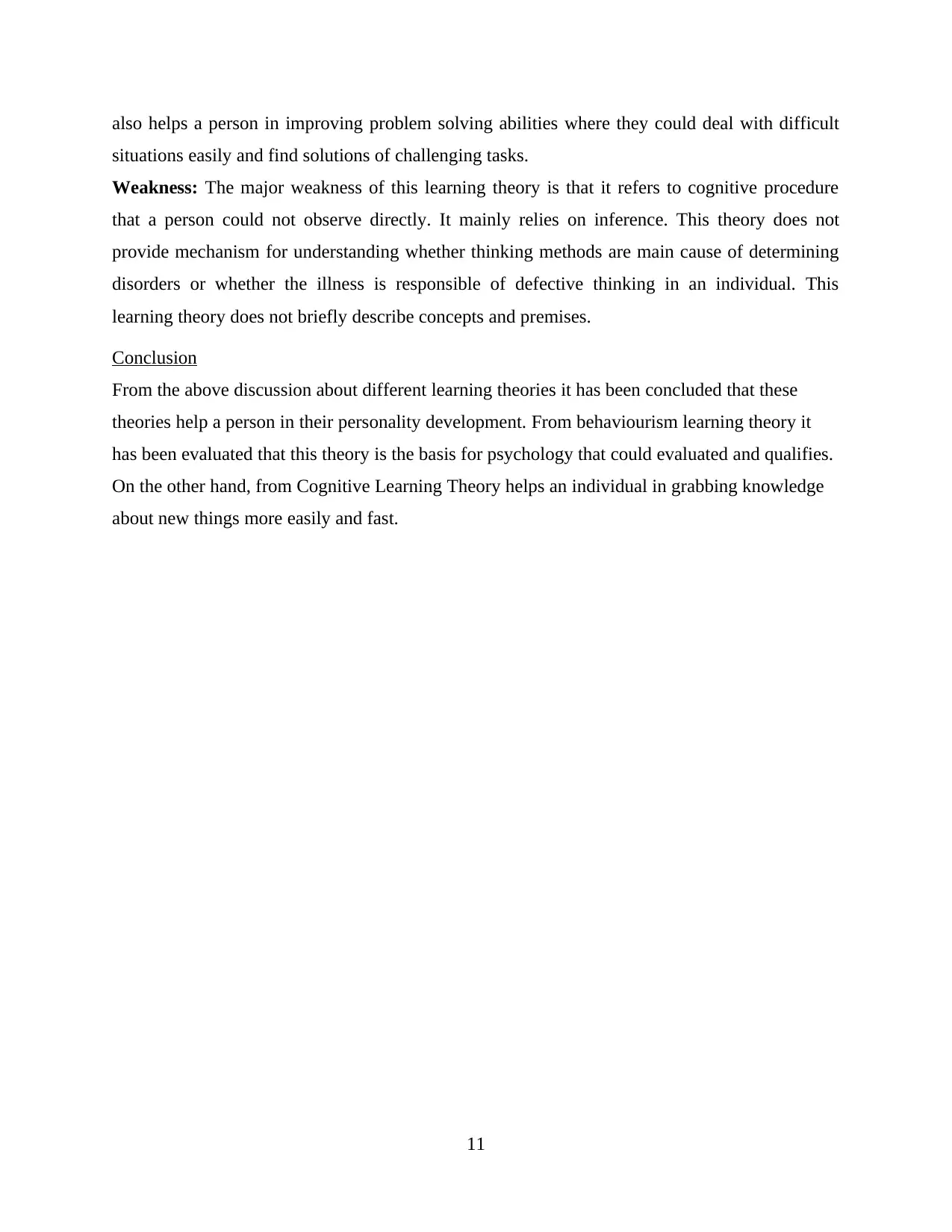
also helps a person in improving problem solving abilities where they could deal with difficult
situations easily and find solutions of challenging tasks.
Weakness: The major weakness of this learning theory is that it refers to cognitive procedure
that a person could not observe directly. It mainly relies on inference. This theory does not
provide mechanism for understanding whether thinking methods are main cause of determining
disorders or whether the illness is responsible of defective thinking in an individual. This
learning theory does not briefly describe concepts and premises.
Conclusion
From the above discussion about different learning theories it has been concluded that these
theories help a person in their personality development. From behaviourism learning theory it
has been evaluated that this theory is the basis for psychology that could evaluated and qualifies.
On the other hand, from Cognitive Learning Theory helps an individual in grabbing knowledge
about new things more easily and fast.
11
situations easily and find solutions of challenging tasks.
Weakness: The major weakness of this learning theory is that it refers to cognitive procedure
that a person could not observe directly. It mainly relies on inference. This theory does not
provide mechanism for understanding whether thinking methods are main cause of determining
disorders or whether the illness is responsible of defective thinking in an individual. This
learning theory does not briefly describe concepts and premises.
Conclusion
From the above discussion about different learning theories it has been concluded that these
theories help a person in their personality development. From behaviourism learning theory it
has been evaluated that this theory is the basis for psychology that could evaluated and qualifies.
On the other hand, from Cognitive Learning Theory helps an individual in grabbing knowledge
about new things more easily and fast.
11
Paraphrase This Document
Need a fresh take? Get an instant paraphrase of this document with our AI Paraphraser
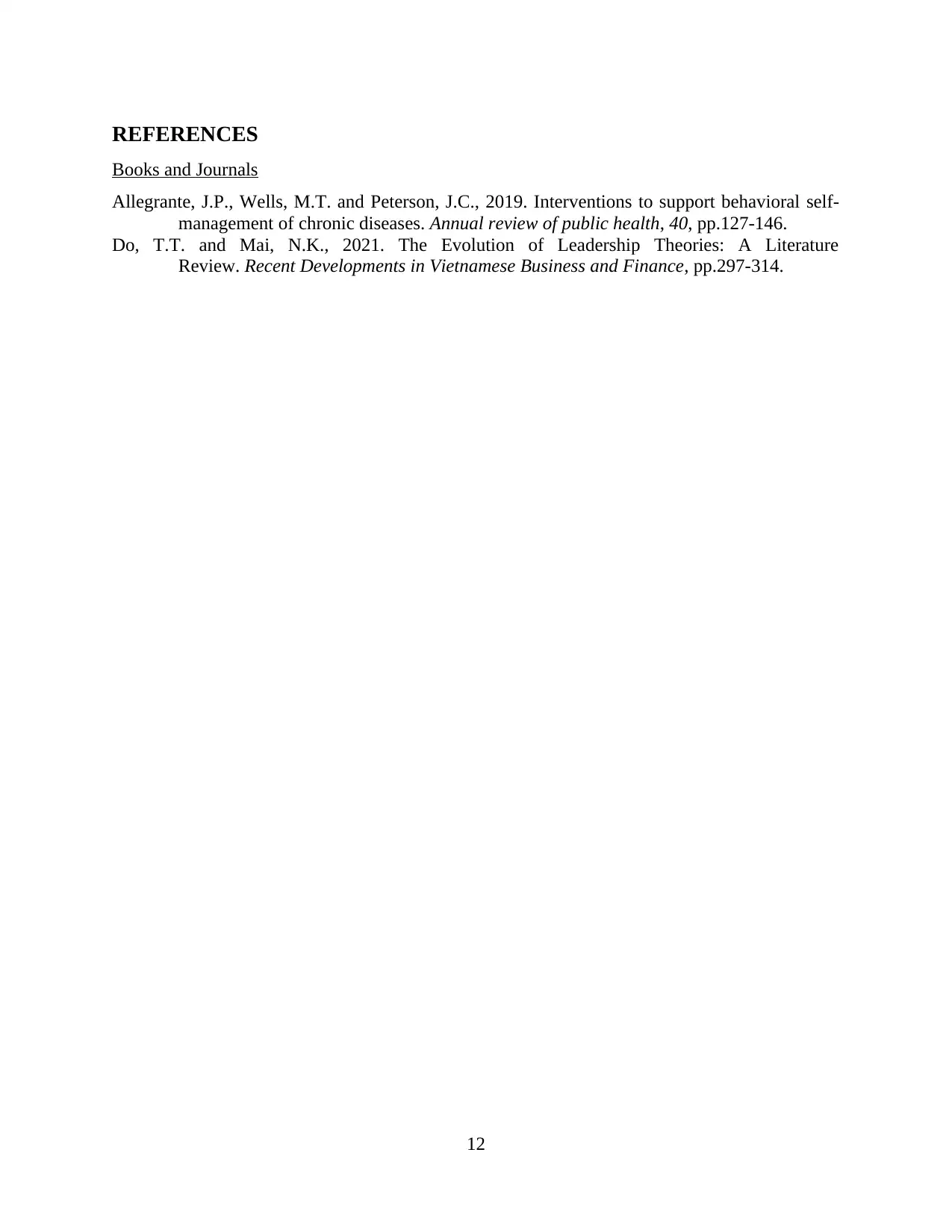
REFERENCES
Books and Journals
Allegrante, J.P., Wells, M.T. and Peterson, J.C., 2019. Interventions to support behavioral self-
management of chronic diseases. Annual review of public health, 40, pp.127-146.
Do, T.T. and Mai, N.K., 2021. The Evolution of Leadership Theories: A Literature
Review. Recent Developments in Vietnamese Business and Finance, pp.297-314.
12
Books and Journals
Allegrante, J.P., Wells, M.T. and Peterson, J.C., 2019. Interventions to support behavioral self-
management of chronic diseases. Annual review of public health, 40, pp.127-146.
Do, T.T. and Mai, N.K., 2021. The Evolution of Leadership Theories: A Literature
Review. Recent Developments in Vietnamese Business and Finance, pp.297-314.
12
1 out of 14
Your All-in-One AI-Powered Toolkit for Academic Success.
+13062052269
info@desklib.com
Available 24*7 on WhatsApp / Email
![[object Object]](/_next/static/media/star-bottom.7253800d.svg)
Unlock your academic potential
© 2024 | Zucol Services PVT LTD | All rights reserved.


